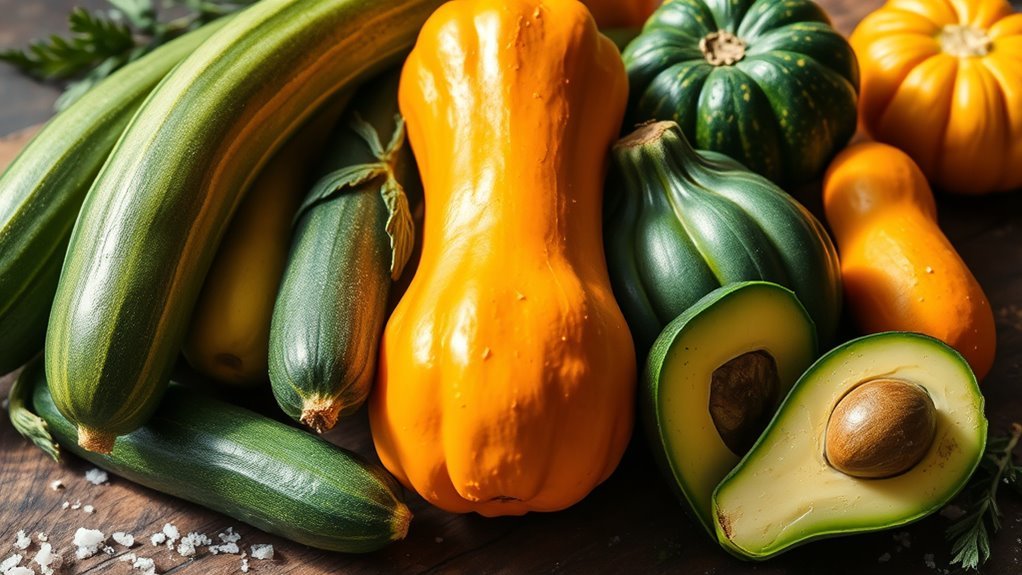Squash can be keto-friendly, but its carbohydrate content varies considerably between types. Zucchini and yellow squash are low in carbs, with only 3-4 grams of net carbs per 100 grams, making them great options for maintaining ketosis. However, butternut and acorn squash contain higher carb counts, so moderation is key. You can enjoy squash in various dishes, from spiralized noodles to roasted sides. There’s much more to learn about integrating these nutritious varieties into your meal plans.
Understanding the Different Types of Squash

When you plunge into the world of squash, you’ll find that there are several varieties, each with its unique flavor and culinary uses. Acorn, butternut, and spaghetti squash are just a few examples. Each type offers distinct health benefits; for instance, butternut squash is rich in vitamins A and C, supporting your immune system. The cooking methods for these squashes are diverse—roasting brings out their natural sweetness, while steaming preserves nutrients effectively. You can also purée them for soups or mash them as a side dish. By exploring different varieties and cooking techniques, you can enjoy a delicious and nutritious addition to your meals, all while embracing a keto-friendly lifestyle that promotes freedom in your food choices. Be mindful of carbohydrate content when incorporating squash into your meals to maintain ketosis.
Nutritional Breakdown of Common Squash Varieties

Squash varieties are not just versatile in the kitchen; they’re also packed with nutrients that can enhance your keto-friendly diet. Here are some key nutritional benefits of popular squash types:
- Zucchini: Low in calories and high in vitamin C, it supports immune function and skin health.
- Butternut Squash: Rich in potassium and fiber, it aids digestion while providing antioxidants that combat inflammation.
- Acorn Squash: Contains essential vitamins A and C, promoting eye health and reducing oxidative stress.
Incorporating these squash varieties into your meals not only adds flavor but also elevates your nutrient intake, giving you the freedom to enjoy delicious, healthy dishes without compromising your keto goals. Additionally, understanding the carbohydrate content of different squash varieties is crucial for maintaining a low-carb lifestyle. Embrace the versatility and health benefits of squash!
Carbohydrate Content and Its Impact on Ketosis

Although many vegetables can be high in carbohydrates, squash varieties offer a unique balance that can fit into a ketogenic diet. For instance, zucchini and yellow squash contain about 3-4 grams of net carbs per 100 grams, making them ideal for keto adaptations. The lower carbohydrate content allows you to enjoy these vegetables while maintaining ketosis, as they won’t greatly spike your blood sugar levels. However, some squash varieties, like butternut and acorn squash, have higher carb counts, so moderation is key. By selecting the right types and monitoring your portions, you can incorporate squash into your diet without derailing your keto goals. Understanding the carbohydrate content empowers you to make informed choices that support your low-carb lifestyle. Additionally, it’s important to be aware of net carb counts when planning your meals to ensure you stay within your carbohydrate limits.
Incorporating Squash Into a Keto Meal Plan
For those looking to enhance their ketogenic meal plans, incorporating squash can be both delicious and nutritious. With its versatility, you can create satisfying dishes that keep your carb count low while enjoying vibrant flavors. Here are three ways to incorporate squash into your meal prep:
Elevate your keto meals with versatile squash for delicious, low-carb dishes filled with vibrant flavors.
- Spiralize butternut squash for a low-carb pasta alternative, topped with your favorite keto-friendly sauce.
- Roast acorn squash with olive oil and spices for a warm, comforting side dish that complements your protein.
- Stuff spaghetti squash with seasoned ground meat, cheese, and veggies for a hearty main dish.
Additionally, choosing lower-carb squash varieties can help you maintain your keto goals while enjoying diverse flavors. Experimenting with these squash recipes can add excitement to your meals while aligning with your keto lifestyle, giving you the freedom to enjoy nutritious, low-carb options.
Alternative Low-Carb Vegetables to Consider
When exploring a ketogenic diet, you might find yourself seeking out a variety of low-carb vegetables to keep your meals exciting and nutrient-dense. Consider incorporating zucchini noodles, which are a fantastic alternative to traditional pasta. They’re low in carbs and high in vitamins, making them perfect for a keto lifestyle. Spaghetti squash is another excellent choice; when cooked, its flesh separates into strands resembling pasta, giving you a satisfying, hearty base for your favorite sauces. Other low-carb options include cauliflower, which can be riced or mashed, and leafy greens like spinach and kale, which are packed with nutrients. These alternatives not only enhance your meals but also support your health goals while keeping your carb intake in check. Additionally, cauliflower is a low-carb powerhouse that provides a versatile ingredient option for a variety of dishes.
Frequently Asked Questions
Can I Eat Squash on a Strict Keto Diet?
You can eat squash on a strict keto diet, but you’ll need to be mindful of the varieties you choose. Zucchini and yellow squash are lower in carbs and can fit well within your daily limits, while acorn and butternut squash are higher in carbs and might not be ideal. Consider keto alternatives like cauliflower or leafy greens if you want to minimize your carb intake while still enjoying delicious meals. Balance is key!
What Are the Best Cooking Methods for Keto-Friendly Squash?
The best cooking methods for keto-friendly squash include roasting techniques and spiralizing options. Roasting enhances the natural sweetness and flavor, while keeping the carbs in check. Try tossing squash pieces with olive oil, salt, and your favorite herbs before roasting at high temperatures. Spiralizing can transform squash into low-carb noodles, perfect for a pasta alternative. Both methods let you enjoy delicious meals that fit your keto lifestyle without feeling restricted.
Are There Any Health Benefits of Eating Squash on Keto?
Yes, there are health benefits to eating squash on keto. With its nutritional value, squash delivers essential vitamins like A and C while being low in carbs. Its fiber content aids digestion and promotes a feeling of fullness, which can help you manage cravings. Plus, the antioxidants found in squash support overall health. Including it in your meals can enhance your keto experience, providing both satisfaction and nutritional benefits without compromising your diet.
How Does Squash Compare to Other Keto Vegetables?
Squash offers a unique nutritional profile compared to other keto vegetables. With about 6 grams of carbs per cup, it’s lower than potatoes and corn, making it a great option. You’ll find that squash nutrition is rich in vitamins A and C, providing essential antioxidants. While leafy greens like spinach and kale are excellent vegetable alternatives, squash adds variety to your meals, keeping your keto journey enjoyable and freeing you from monotony.
Can I Use Squash in Keto-Friendly Desserts?
Absolutely, you can use squash in keto-friendly desserts! Squash dessert recipes often incorporate low carb sweeteners like erythritol or stevia, making them a delicious and suitable option for your diet. The natural sweetness of squash, especially varieties like butternut, complements these sweeteners beautifully. Just remember to keep an eye on portion sizes and total carb counts to stay within your desired keto limits while enjoying creative and satisfying treats!
References
- https://www.healthline.com/nutrition/keto-friendly-vegetables
- https://www.dietdoctor.com/low-carb/vegetables
- https://www.ncbi.nlm.nih.gov/pmc/articles/PMC6520870/
- https://www.medicalnewstoday.com/articles/330984
- https://www.webmd.com/diet/ss/slideshow-keto-foods
- https://www.cdc.gov/healthyweight/healthy_eating/vegetables.html
- https://www.hsph.harvard.edu/nutritionsource/what-should-you-eat/vegetables/


